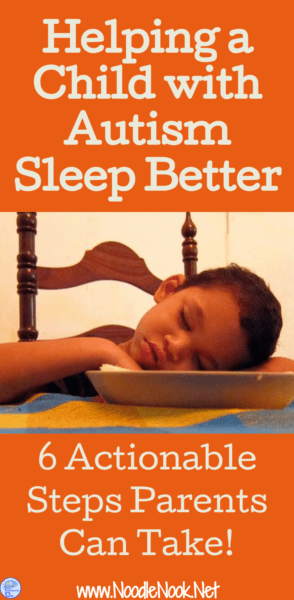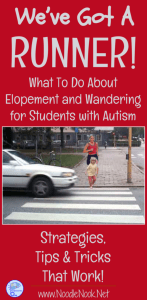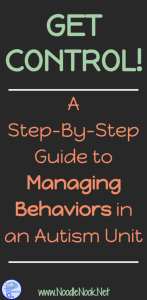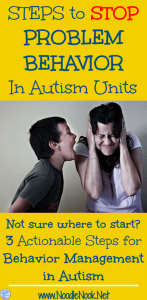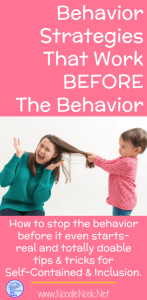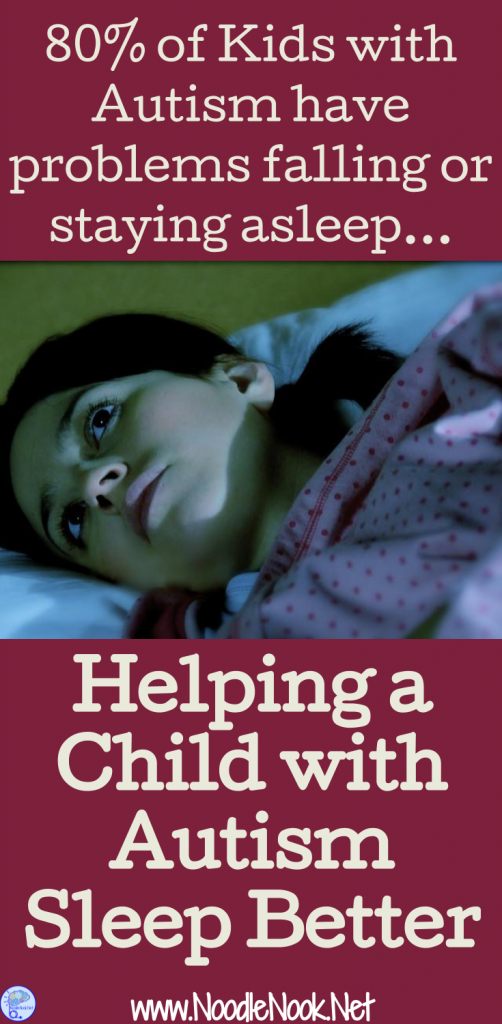Kids with Autism who get a poor night’s sleep often have problems with behaviors at school- that may be aggression and agitation, social withdrawal and isolation, or even sleeping in school. So what to do? This is a conversation worth having with parents, and may help you get through your day a little better!
Helping a Child with Autism Sleep Better!
I had a student for several years who I loved, but was often very agitated in the mornings. His mom repeatedly told me it was because he didn’t sleep well the night before… except this seemed to be every night! I know when I don’t get a good night’s sleep I am a total mess. After some time she told to me that she would find her son standing in the middle of the street at 3 a.m. or get a call in the middle of the night from the convenience store down the street that he had walked to. She was worried all the time about his safety and also general sleep deprivation!
We talked about strategies to cope with a child that leaves the house or elopes from home, but never really talked about his sleep patterns. It was not until later in my teaching career that I really understood the challenges faced with parents of children with Autism and sleep.
[dt_gap height=”10″ /]
Sleep Matters- And It IS a Problem!
I recently had a teacher talk to me about a student having increased problem behaviors in class. After much investigation, it turned out sleep was partly to blame! Statistics suggest that 80% of children with Autism also have issues with falling asleep or staying asleep. That’s a whole heck of a lot of kiddos! The thing is that lack of sleep or lack of quality sleep can directly impact your classroom. Students with Autism who have poor sleep can have a hard time focusing or remembering information, may have more inappropriate behaviors in the classroom, or may have issues with hyperactivity leading to more stimming behaviors. All of this can spell trouble for you as you manage your class, but also can these side effects of lack of sleep can make it difficult for a student to learn.
[dt_gap height=”10″ /]
Sleep Tips for Kids with Autism
As a parent, there are some sleep tips that can help you get a child with Autism asleep and keep them asleep.
- Create a predictable routine and stick with it! Having a consistent bedtime and a routine that signals that bedtime will help a child fall asleep better. Maybe is it a routine of brushing teeth, taking a bath, or reading. It that sounds like the seventh vortex of hell for a parent of a student with less tolerance for such things, putting on music that cues bedtime is coming may help. Just be sure that part of the routine is to cut off all electronics about an hour before bed. The lights from most devices actually does the opposite of signaling sleep, so ditch digital devices! You may also consider setting a bedtime alarm so the routine gets signaled at a consistent time. It also makes the alarm clock the ‘bad guy’ and not the parent who is telling a child it’s time.
- Pay special attention to activity level during the day and diet. When you have a day full of activity and movement, you sleep better. If you spend the day watching TV, you may never get to the point of feeling tired. Same goes for kids with Autism, or any kid… if they can get 60 minutes or more of exercise or activity, then they will sleep better. Diet can impact sleep as well. Kids should be avoiding caffeine and sugar for at least an hour before bedtime, but 3 is better. Be sure a child is getting good nutrition as well. I know, nuggets and mac & cheese are what they like, but we gotta get some vitamin, minerals, and goodness in too. Consider a multivitamin or other means minimizing deficiencies.
- Try blackout curtains or a white noise device. I personally sleep with a white noise machine. I take it with me when I travel. It makes the process of falling asleep so much easier for me, especially when I sleep in a new place. For a child with Autism, the sensory input that you may not notice in and around the house may be the culprit keeping or waking up them up! The air conditioner activating, the neighbor pulling into their driveway and opening the garage, a siren, or even a dog barking can all be sounds that interrupt the sleep cycle. And with sensory processing issues, a child with Autism may need a little something extra to keep out the input.
- Consider a Weighted Blanket! As a parent of a child with Autism, there are things about your child only you will understand. The sensory needs are tough to figure out sometimes. Although the science says that weighted blankets don’t do much to help a child with Autism sleep through the night or fall asleep faster (Read more on the science here), they do find that kids with Autism and their parents prefer it to a regular blanker. If you are struggling with helping a child with Autism sleep better, it may be worth a try. Get one from Amazon so you can easily return it if it doesn’t work out.
More Tips that Help Everyone Sleep Better
Yes, there are special considerations to helping a child with Autism sleep better, but some of the same suggestions that work for the masses work for them too. Try to be sure of the following:
- Take the TV out of the bedroom. The only two things that should be happening in a bedroom are sleep and sex. That goes for parents too! Take out the TV, put away the devices and make the bedroom a place that oozes the sleep vibe! Make it a comfortable and inviting place to sleep… and designate other places in the house to read, watch tv, and use devices. Kids with Autism can be dictated by routine and rules- be sure the rule is we use the bedroom to sleep!
- Eat balanced meals and allow time to digest it. I am guilty of this one just tonight! My family went out to eat kind of late, came home, and started getting ready for bed. My dinner literally feels like a weight in my gut. I sent the kiddos to bed, but the thought of crawling in myself makes my stomach churn. Be sure your child has time to process what they’ve eaten before you shoo them off to bed.
- Kick the nap! I love a good nap, but I learned long ago that if I am going to nap it has to be for 30 minutes or three hours. Anything in between makes me funny in the head. If I even attempt to ‘nap’ after work so close to my normal bedtime, it throws a monkey wrench in my sleep patterns. Same holds true for kids with Autism- avoid long naps during the day and also napping close to bedtime.
I Need More!
Having a discussion with parents about things that happen in the home can be tough. Feel free to share this article with parents who you think struggle with sleep in their children with Autism. With such a high incidence of students with Autism that struggle with sleep issues, passing this on to all parents is bound to help someone.
And let’s face it, helping a child with Autism sleep better is a quality of life issue for the child, the parents, and you!
If you want to learn more about Sleep and Children with Autism, you can read more at Tuck.Com or Autism Speaks.
Teach On, Rock Star!!


